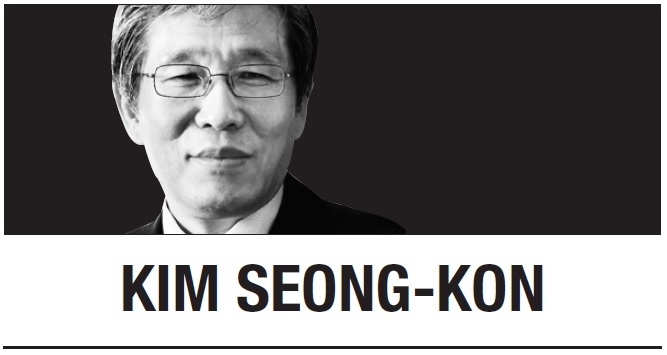[Kim Seong-kon] Putting an end to hostilities in our society
By Korea HeraldPublished : June 15, 2022 - 05:31

Hostilities stem from grudges and resentment against others and thus gravely endanger the public health of our society. To make matters worse, hostile sentiments inflict unbearable psychological pain on us, leave indelible scars in our hearts, and make our souls incurably ill. If we harbor hostile feelings, grudges, and resentments, it will make our lives small and petty until the day we die. Why, then, would we want to hold onto hostile feelings?
If someone has done harm to us, we may harbor hostile feelings against that person. However, the hostilities in our society are mostly ideological, instigated by ideology-obsessed politicians under the pretense of social justice, fairness and equality. Thus, we are hostile to those who have never done harm to us directly. Instead, we hate them simply because they have different opinions, more privileges or better chances.
A 2017 American Western film, “Hostiles,” is a powerful movie that explores the problems of such negative human abhorrence. The film begins with a horrid scene set in 1892, when Comanche warriors attack settler Rosalee Quaid’s home in New Mexico, brutally killing her husband and three children. Hiding in the forest, she barely survives. Grief-stricken as she has lost everyone she loves, Rosalee’s hatred and resentment toward Native Americans is beyond description.
Meanwhile, at nearby Fort Berringer, US Army Capt. Joseph Blocker, too, hates Native Americans because they have killed so many of his soldiers cruelly on battlefields. One day, by President Harrison’s orders he has to escort cancer-stricken Cheyenne Chief Yellow Hawk and his family back to their land in Montana. Thus, Blocker sets out to Montana with the Native American chief and his family, full of hostility toward them.
On their way to Montana, they come across Rosalee Quaid’s house. Blocker persuades traumatized Rosalee to join them until the next stopover in Colorado. She agrees to do it, but detests the Cheyenne chief and his family, who remind her of the Comanche warriors who killed her husband and children in cold blood. In her eyes, all Native Americans are the same.
During their journey to Montana, however, they encounter several eye-opening incidents. First, when the ambushed Comanche attack them, Yellow Hawk asks Blocker to unchain him and his family, so they could be of help in times of future Comanche attack. Then, Blocker and Rosalee witness that unchained Cheyenne kill the Comanche for the safety of the white people who loathe them.
Watching Yellow Hawk and his family, both Blocker and Rosalee come to realize that not all Native Americans are wicked or bad. Furthermore, after three white fur traders abduct and rape the Cheyenne chief’s wife, daughter and Rosalee, they realize that people can be bad whatever race they are.
Just as they arrive on Cheyenne tribal land in Montana, Yellow Hawk dies of cancer. As they bury his body in the Cheyenne territory, a white rancher and his three hands appear and claim that it is their land now, and thus forbid the burial of the Cheyenne chief’s body there. When Blocker refuses, shooting begins. During the shootout, the ranchers are killed. The Cheyenne chief’s wife and daughter, together with a white soldier, die as well. This time, Blocker and Rosalee can see why Native Americans harbor such intense hostility toward the white settlers.
Their journey to the Native American territory is a series of mind-opening scenes for them. At the end of the journey, Blocker and Rosalee are no longer hostile toward Native Americans. Instead, they now can embrace their enemies and reconcile with them. At the end of the movie, Roslaee decides to take Yellow Hawk’s orphan son Little Bear with her to Chicago.
The film enlightens us with a profound insight that nurturing hostile feelings is absurd and harmful by nature and we should put an end to our hostile feelings toward other people. It also suggests that we should try to understand others who are different from us, and overcome our resentment and grudges.
Indeed, we should build a society, based on reconciliation and understanding, not hostility and resentment. In our society, there are intense hostilities between the left and the right; between progressives and conservatives; and between the poor and the rich. Hostilities also deteriorate friendships between the young and the old -- and even between men and women.
It is high time that we put an end to the hostilities that have plagued our society.
Kim Seong-kon
Kim Seong-kon is a professor emeritus of English at Seoul National University and a visiting scholar at Dartmouth College. The views expressed here are his own. -- Ed.
-
Articles by Korea Herald








![[Graphic News] More Koreans say they plan long-distance trips this year](http://res.heraldm.com/phpwas/restmb_idxmake.php?idx=644&simg=/content/image/2024/04/17/20240417050828_0.gif&u=)
![[KH Explains] Hyundai's full hybrid edge to pay off amid slow transition to pure EVs](http://res.heraldm.com/phpwas/restmb_idxmake.php?idx=644&simg=/content/image/2024/04/18/20240418050645_0.jpg&u=20240419100350)






![[From the Scene] Monks, Buddhists hail return of remains of Buddhas](http://res.heraldm.com/phpwas/restmb_idxmake.php?idx=652&simg=/content/image/2024/04/19/20240419050617_0.jpg&u=20240419175937)

![[KH Explains] Hyundai's full hybrid edge to pay off amid slow transition to pure EVs](http://res.heraldm.com/phpwas/restmb_idxmake.php?idx=652&simg=/content/image/2024/04/18/20240418050645_0.jpg&u=20240419100350)

![[Today’s K-pop] Illit drops debut single remix](http://res.heraldm.com/phpwas/restmb_idxmake.php?idx=642&simg=/content/image/2024/04/19/20240419050612_0.jpg&u=)